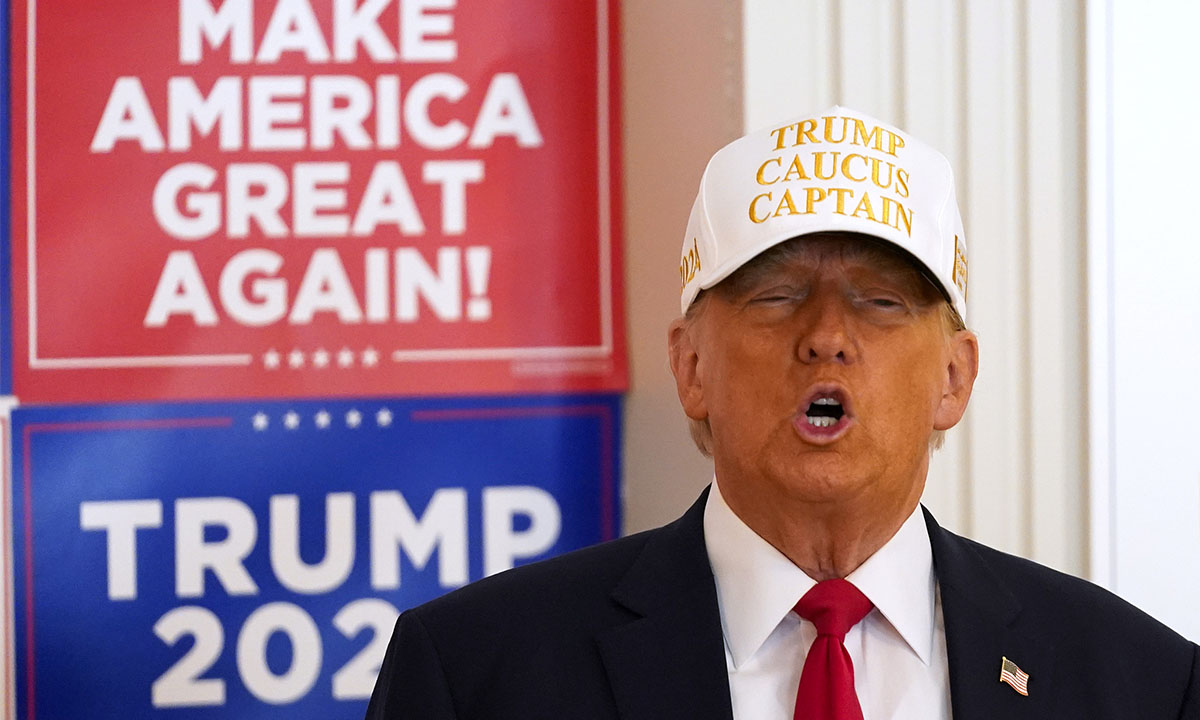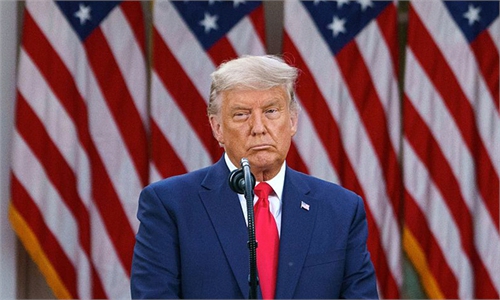Trump gets unshaken support in Iowa caucuses votes, signifies US populism tendency

Republican presidential candidate former US president Donald Trump speaks to volunteers at Hotel Fort Des Moines in Des Moines, Iowa, January 14, 2024. Photo: VCG
Former US president Donald Trump scored a record-setting win in the Iowa caucuses on Monday local time, affirming his grip on the 2024 Republican presidential nomination and a scenario in which he will rival incumbent President Joe Biden in the general election.
Though leaving the White House three years ago in a farcical way, Trump has never left the center of public attention. His likely return in November, with controversies and lawsuits, signifies the deep divisions and populist tendencies in American society and accelerates the decadence of US democracy, analysts said Tuesday.
Chinese experts also noted that while the Chinese public can watch with fun the US general election as a drama, we cannot have any illusion that one particular candidate wins may lead to any significant positive adjustments in the US' China policy.
Though Trump secured a 30-percentage point victory over Florida governor Ron DeSantis, the caucus saw the lowest-turnout in a quarter-century, the Associated Press reported.
As a blizzard swept Iowa and with wind-chill temperatures dropping to -34 C, participants endured "life-threatening cold" to cast ballots.
To encourage local Iowans to vote, Trump said at a campaign event that "If you're sick as a dog, you say, 'Darl, I've got to make it.' Even if you vote and then pass away, it's worth it."
An ironic contrast is that hours after the primary caucus, Trump was expected to be in court in New York on Tuesday for a civil suit over alleged defamation of columnist E Jean Carrol, whom he was last year found liable to have sexually assaulted.
Trump faces 91 criminal charges in total, yet he has unwavering support - a Des Moines Register/NBC poll suggested 61 percent of Republican caucus voters report that a potential conviction would not affect their support of Trump - and 19 percent said a conviction would make it more likely they would support him.
Li Haidong, a professor at the China Foreign Affairs University, told the Global Times on Tuesday that Trump's campaign strategy has always been about stirring up political, economic and sociocultural antagonism to consolidate his voter base - and it works, judging from his die-hard fans.
As the criminal charges failed to shake Trump, Democrats sought to disqualify Trump's qualification as a presidential candidate in multiple states for his role in the Capitol riot. It is the Supreme Court's turn to decide whether Trump can continue to run for president and the justices have scheduled arguments for February 8, Politico reported.
Since 2016, the year when Trump won the general election, the US has embarked on a path of political extremism and social division, and the two elements have continuously reinforced each other in the past eight years, leading to a US today that is chaotic, unpredictable and dangerous, Li said.
US politics is becoming increasingly violent. Bomb scares, swatting incidents and death threats targeting public officials have risen in frequency since the start of 2024, the Washington Post reported on January 9, hinting on the phenomenon as due to the aftermath of the 2020 presidential election.
The US has entered a phase that candidates attack each other on everything, losing focus on policy agenda.
"No matter who wins the presidential election, the US can only continue in that direction of populism," Li noted.
Lü Xiang, a research fellow at the Chinese Academy of Social Sciences told the Global Times on Tuesday that after the Capitol riot in 2021, a potential Trump-Biden rivalry between two old men in 2024 fully demonstrates the decadence of US politics.
The division on interests between the Democrats and Republicans has reached an irreconcilable point. The current political system in the US cannot bridge such contradictions but rather is aggravating them, leading to political deadlock, which means that whoever takes office will not have the ability to lay out a path for the country, Lü said.
Analysts stressed that the US is not choosing between center-left or center-right, but is oscillating fiercely between far-left and far-right, and an uncertain US constitutes a threat to the world.

